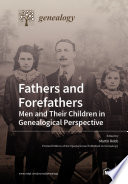

Most ebook files are in PDF format, so you can easily read them using various software such as Foxit Reader or directly on the Google Chrome browser.
Some ebook files are released by publishers in other formats such as .awz, .mobi, .epub, .fb2, etc. You may need to install specific software to read these formats on mobile/PC, such as Calibre.
Please read the tutorial at this link: https://ebookbell.com/faq
We offer FREE conversion to the popular formats you request; however, this may take some time. Therefore, right after payment, please email us, and we will try to provide the service as quickly as possible.
For some exceptional file formats or broken links (if any), please refrain from opening any disputes. Instead, email us first, and we will try to assist within a maximum of 6 hours.
EbookBell Team

5.0
68 reviewsFathers and Forefathers
Research on fathers and fatherhood has blossomed in recent years, focusing, for the most part, on present-day fathering experiences but also beginning to uncover hidden narratives of past fatherhood. This collection aims to add something new to this expanding field by exploring the dynamic relationship between present and past fatherhoods. The popular understanding of fathers in past generations, as being detached and uninvolved in the lives of their children, can be said to play a significant part in the construction of modern fathering identities, with ideas of “new” fatherhood being played off against notions of historical fathering practices. However, research has begun to show that these popular myths often misremember the past, judging it by current standards and obscuring the diverse nature of fathering practices in the recent and distant past. A genealogical approach is able to critically examine these intergenerational constructions of fatherhood and more positively illuminate the ways in which experiences of fathering and being fathered are passed on between generations. The contributions to this collection use a genealogical approach (broadly defined) to fathering and fatherhood as a way of defamiliarizing accepted narratives and suggesting new ways of thinking about men and their relationships with their children.About the Editor:
Martin Robb is Senior Lecturer in the Faculty of Wellbeing, Education and Language Studies at The Open University (UK), where he is currently the academic lead for the Masters degree in Childhood and Youth Studies. His research has focused on issues relating to gender and care and has included studies of fatherhood, men working in childcare, and young masculinities. He is the author of ‘Men, Masculinities and the Care of Children: Images, Ideas and Identities’ (Routledge, 2020).